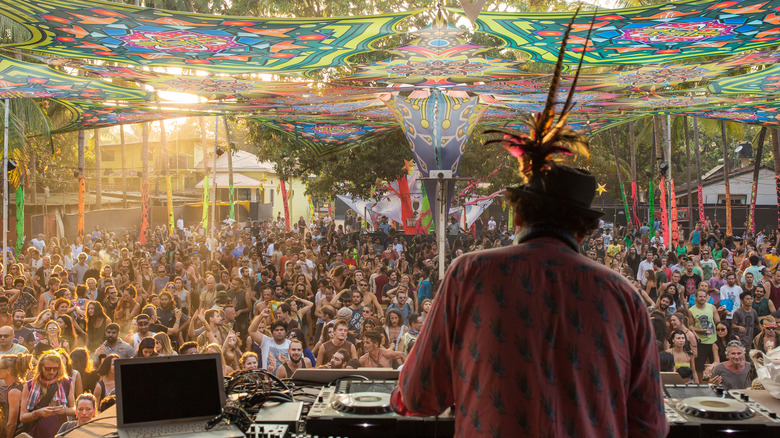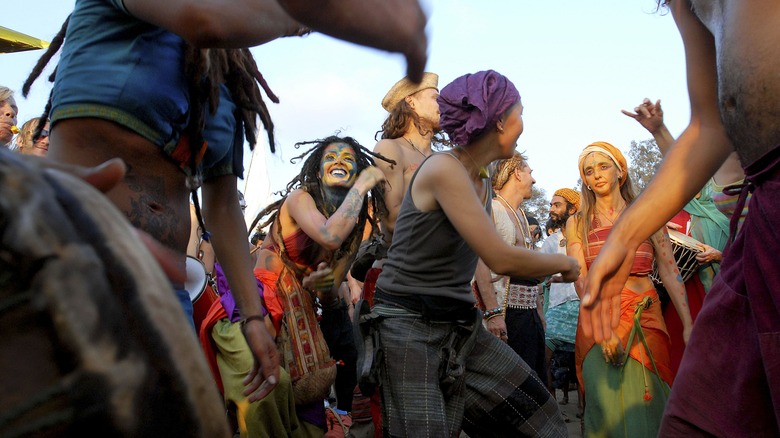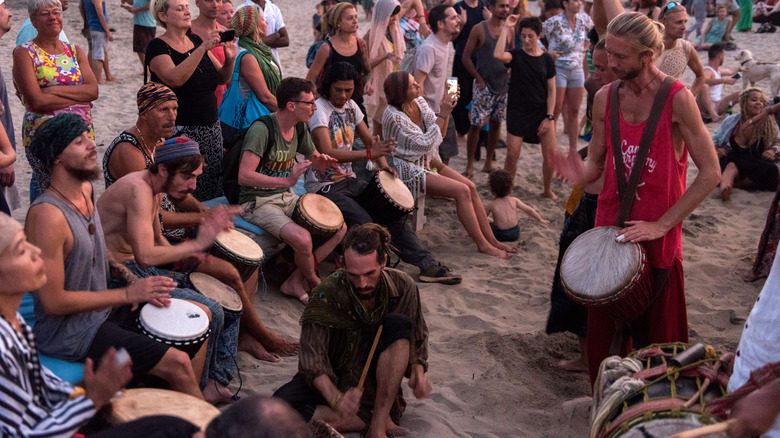Goa Is Quickly Claiming Its Place Among India's Destinations For Exciting Nightlife
Located on the southwestern coast of India, Goa is known for its idyllic beaches, historical temples, eclectic culture, and outer (or inner) space nightlife. Per World History, Goa was a Portuguese colony for 450 years, and this blend of Portuguese and Indian cultures made Goa a uniquely welcoming and tolerant place — religiously and culturally.
Goa remained a Portuguese colony until 1961, and perhaps because of its inherent cultural openness, Goa became a popular hippie destination during the 1970s. Today, Goa remains a popular destination for free-thinkers, artists, musicians, spiritualists, partiers, and backpackers.
While it isn't the exact same free-loving hippie hub of the '70s, Goa retains much of the identity. You can still sit around a drum circle, share sunset jam sessions, participate in impromptu yoga classes, shop handmade crafts at markets, or just sway in a hammock. When it comes to nightlife, Goa blends this cultural heritage with diverse venue options to appease the most discerning reveler. In other words, after that sunset jam session, the normally laid-back coastal state of Goa sits up and starts dancing.
The evolving heritage of Goa Trance
According to It's Goa, the hippie culture initially came to 1970s Goa because the seaside area was a destination on the world's Hippie Trail. The hippie culture then persisted because Goa was typically the last stop on this fabled trail. Over the years, Goans continued to exude a culture of openness, creativity, artistic expression, and communal living, which is still alive and dancing today.
Goa's nightlife is a prime example of modernity mixing seamlessly with an area's iconic cultural heritage. If you head to a nightclub, dance at a beach rave, or attend a music festival, you're bound to hear Goa Trance, which is a blend of Hindi-influenced harmonies over fast, danceable bass lines. Although this sub-genre of Psytrance began in the '90s, the sound continues to evolve and has become synonymous with Goa's party scene.
And while raves and dance parties play a large role in its party scene, Goa's nightlife isn't exclusively characterized by raves and electronica. Much like everything else in Goa, the nightlife is eclectic and offers something to suit all tastes.
Late nights and fresh starts
For years, Goa was known for its raucous, all-night outdoor raves. Think India's less-touristy answer to Thailand's Full Moon Parties. However, this has largely changed. According to the Goa Herald, laws now restrict noise pollution from the hours of 12 a.m. to 4 a.m., which pretty much eliminates late-night raves — at least outside.
The club scene still goes on late into the night. If you want to party al fresco, you can still dance at daytime outdoor raves or those that start and end earlier in the evening. The most electric, vibrant, and danceable nightlife is typically found in the northern part of the city, while the southern area has a more laid-back feel. With that said, you'll find bustling beach shacks, lounges, and bars throughout most of coastal Goa.
One of the best things about Goa's nightlife is the next day in Goa. Hear us out. While you may not feel 100% after a night out, take a mud bath at the hot water springs near Arambol Beach, grab a homemade snack from the Hippie Market, find a spot on the beach with some much needed sunscreen, and drift away to the drums in the distance. Like most things, Goa's nightlife is all about balance.


